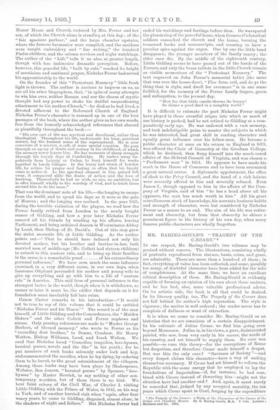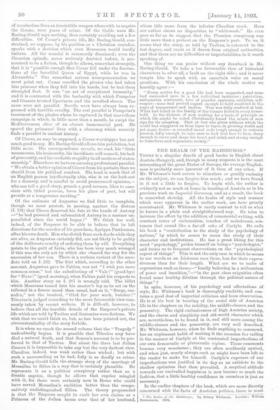MR. BARING-GOULD'S "TRAGEDY OF THE CIESARS." *
IN one respect, Mr. Baring-Gould'a two volumes may be praised without reserve. The illustrations, consisting wholly of portraits reproduced from statues, busts, coins, and gems, are admirable. There are more than a hundred of them ; in fact, everything of value has been collected, and some, possibly too many, of doubtful character have been added for the sake of completeness. At the same time, we have an excellent critical description of them. Mr. Baring-Gould is evidently capable of forming an opinion of his own about these matters, and he has had, also, some valuable professional advice. On its artistic side, the book is all that could be desired. In its literary quality, too, The Tragedy of the Ca38ar8 does not fall behind its author's high reputation. The style is vigorous ; the matter is well ordered ; the reader never has to complain of dullness or want of attraction.
It is when we come to consider Mr. Baring-Gould as an historian that we are conscious of a certain disappointment. In his estimate of Julius Omar, we find him going even beyond Mommsen. Julius is, in his views, a pure, disinterested patriot, who saw, from very early in his career, the needs of his country, and set himself to supply them. No cure was possible—so runs this theory—for the corruptions of Rome but despotism, and therefore Ca3sar made himself a despot. But was this the only cure P "Saviours of Society "—and every despot claims this character—have a way of making themselves necessary. If Omar had set himself to reform the Republic with the same energy that he employed to lay the foundations of Imperialism—if, for instance, he had com- bined with Cicero instead of thwarting him--might not the situation have had another end? And, again, it must surely be conceded that, judged by any accepted morality, the ten years which Omar spent in Gaul, forging by the expenditure * The Tragedy of tho Oruro : a Study of Ow Characters of the Cmgare of the .TuZiecn and Claudien Houses By B. Baring Gould, M.A. 2 vols. London : Methuen and O. 1892.
of numberless lives an irresistible weapon wherewith to acquire the throne, were years of crime. Of the Gallic wars Mr. Baring. Gould says nothing, thus certainly avoiding not a few difficulties. Of Ciesar's private life, Mr. Baring-Gould, con- strained, we suppose, by his position as a Christian moralist, speaks with a decision which even Mommsen would hardly imitate. All the scandal is summarily dismissed ; even the Cacsarion episode, never seriously doubted before, is pro- nounced to be a fiction, though he allows, somewhat strangely, that it is " possible enough that Cmsar fell under the fascina- tions of the beautiful Queen of Egypt, while he was in Alexandria." One somewhat serious misrepresentation we must point out. Omar crucified the pirates who had taken him prisoner when they fell into his hands, but he had them strangled first. It was "an act of exceptional humanity," and it is contrasted with the barbarity with which Pompeius and Crassus treated Spartacus and the revolted slaves. The cases were not parallel. Servile wars have always been re- pressed with horrible cruelty. The real parallel is Pompeius's treatment of the pirates whom he captured in that marvellous 'campaign in which, in little more than a month, he swept the Mediterranean clear of an almost immemorial pest. He spared the prisoners' lives with a clemency which scarcely finds a parallel in ancient history.
Of Cicero, as may be supposed, a Csar-worshipper has not much good to say, Mr. Baring-Gould allows him patriotism, but little more. His correspondence reveals, we read, his "little meanneeses, his insincerity, his inordinate self-conceit, his lack of generosity, and his veritable stupidity in all matters of states- manship." Elsewhere we have an amusing professional parallel. 4' We obtain a better opinion of Cicero from his portaits than we should from his political conduct. His head is much that of an English parson intellectually able, who is on the look-out for a deanery, and is careful to avoid pronounced opinions,— who can tell a good story, preach a good sermon, likes to asso- ciate with titled persons, loves his glass of port, but will preside at a temperance meeting."
Of the estimate of Augustus we find little to complain, though we must protest, in passing, against the dictum (I. 131) that Cicero deserved his fate at the hands of Antony —" he bad pursued and calumniated Antony in a manner un- paralleled since the world began !" We think too well, indeed, of the Emperor to be able to believe that he left directions for the murder of his grandson, Agrippa Posthumus, after his own death. Men who shrink from such deeds while they are alive, as Augustus certainly did, are not likely to be guilty of the deliberate cruelty of ordering them by will, Everything points to the guilt of Livia, who has been very much wronged if this was the only act by which she cleared the way for the succession of her son. There is a curious variant of the anec- dote told on I, 232. The hint which, according to the other account, Augustus gave to Fabius, was not "I wish you more common-sense," but the substituting of " Vale !" (good-bye) for "Have !" (good morning), when Fabius paid his respects to him. Another story on I. 201 is wrongly told. The billet which Maecenas tossed into his master's lap as he sat on the tribunal in a fiercer mood than usual, had on it, "Surge, car- nufex," not the ironical, "Gird for your work, butcher !" Tiberius is judged according to the more favourable view com- monly taken by recent writers. It is difficult, however, to believe that all the horrible details of the Emperor's private life which are told by Tacitus and Suetonins were fictions. We wish that we could think so, but, as has been pointed out, the circumstantiality of the story forbids.
It is when we reach the second volume that the " Tragedy " undoubtedly begins. It is possible that Tiberius may have died a natural death, and that Seneca's account is to be pre- ferred to that of Tacitus. But about the three last Julian °mars it is impossible to take any but the very darkest view. Claudius, indeed, was weak rather than wicked ; but with such a surrounding as he had, folly is as deadly as crime. Mr. Baring-Gould tells the strange story of the marriage of Messalina to Silks in a way that is certainly plausible. He represents it as a political conspiracy rather than as a frantic caprice, though he allows that caprice mingled with it, for there were certainly men in Rome who could have served Messalina's ambition better than the compa- ratively undistinguished Silks. The theory propounded is that the Empress sought to exalt her own claims as a .Princess of the Julian house over that of her husband, whose title came from the inferior Claudian stock. Here our author shows no disposition to "whitewash." He even goes so far as to suggest that the Pisonian conspiracy was little more than a pretext on the Emperor's part. To us, it seems that the story, as told by Tacitus, is coherent to the last degree, and reads as if drawn from original authorities, and that there are no difficulties or improbabilities in it worth speaking of.
One thing we can praise without any drawback in Mr. Baring-Gould. To take a too favourable view of historical characters is, after all, a fault on the right side ; and it never tempts him to speak with an uncertain voice on moral questions. With his conclusion of the whole matter we heartily agree :—
"Every motive for a good life had been suggested, and none had succeeded save in a few individual instances; patriotism, antiquarian sentiment, love of popular applause, ambition, self- respect—none had proved cogent enough to hold mankind in the ways of temperance and justice. This was fully realised at last. What had failed in the family of the Cmars failed in every house- hold. In the distress of men seeking for a basis of principle on which life might be ruled, Christianity found the minds of men ripe for its reception. That at last was given without which the world had staggered on from lapse to lapse, in growing doubt and yet eager desire—a revealed moral code tough enough to restrain passion, lofty enough to raise man to look God face to face, sharp enough to carve and shape his heart and mind, and strong enough to transform and regenerate society."



































 Previous page
Previous page